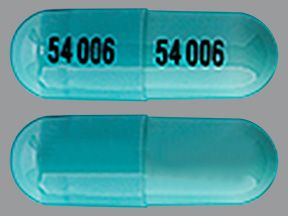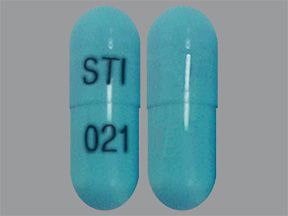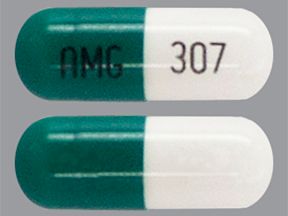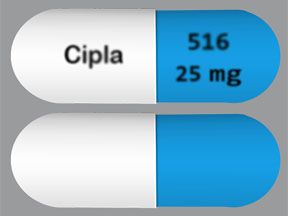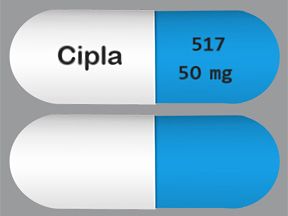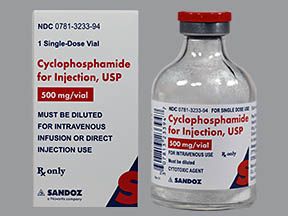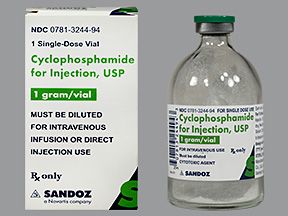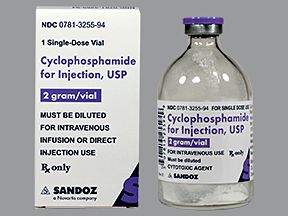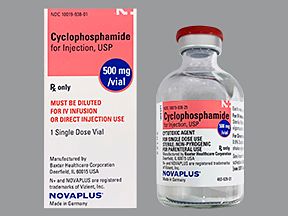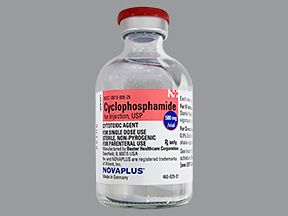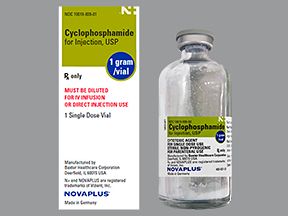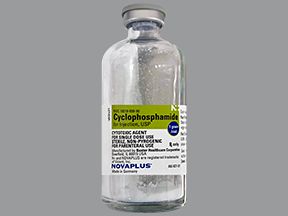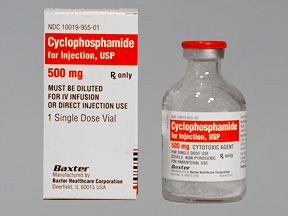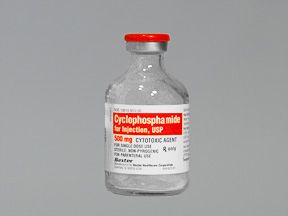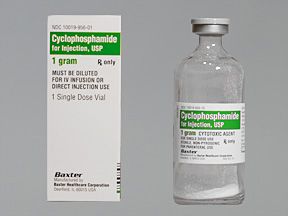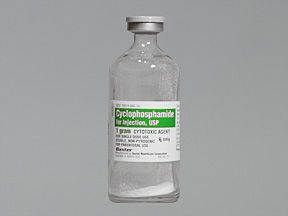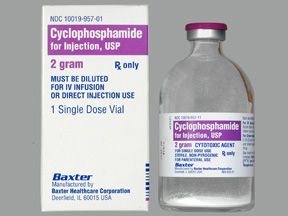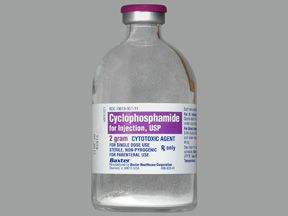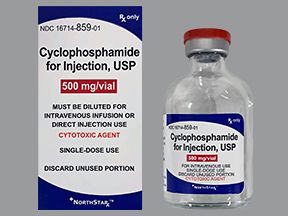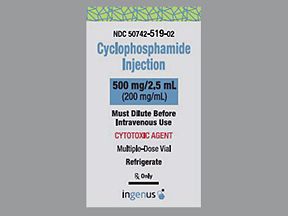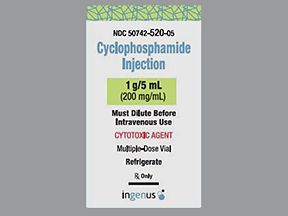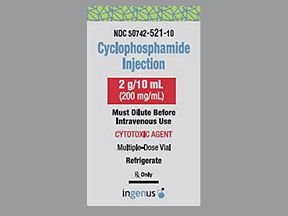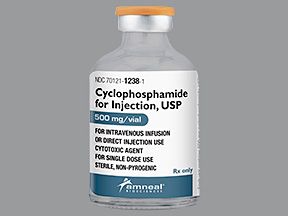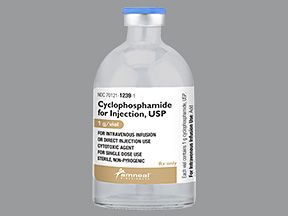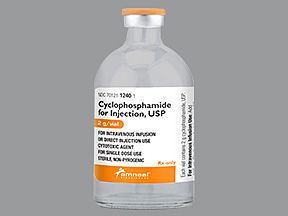Highlights for cyclophosphamide
- Cyclophosphamide injectable solution is only available as a generic drug. It doesn’t have a brand-name version.
- Cyclophosphamide comes as an injectable solution and as a capsule you take by mouth.
- Cyclophosphamide injectable solution is used to treat many types of cancer. A healthcare provider will give you this medication through a needle in your vein. You won’t take this drug at home.
- Infections warning: Cyclophosphamide weakens your immune system. This may make it easier for you to get serious or even fatal infections. It also makes it harder for your body to fight off an infection. Try to stay away from people who are sick or have recently been sick. Tell your doctor about recent infections you’ve had, and let them know if you have any symptoms of an infection, including:
- fever
- chills
- body aches
- Blood in the urine warning: When cyclophosphamide is broken down by your body, it creates substances that irritate your kidneys and bladder. These substances can cause your kidneys or bladder to bleed. If you have blood in your urine and bladder pain, tell your doctor. This may be a sign of a condition called hemorrhagic cystitis. To help prevent this from happening, drink more fluids.
- Infertility and birth defects warning: Cyclophosphamide can cause infertility in both males and females. It interferes with the development of a woman’s eggs and a man’s sperm cells. This drug can also harm a pregnancy if taken by a pregnant woman. It may cause birth defects, miscarriage, fetal growth problems, and toxic effects in a newborn.
Cyclophosphamide is a prescription drug. It comes as an injectable solution. It also comes as a capsule you take by mouth.
A healthcare provider will give you cyclophosphamide injectable solution through an intravenous (IV) infusion into your vein. You’ll receive your infusion at your doctor’s office or hospital. You won’t take this drug at home.
Cyclophosphamide injectable solution is only available as a generic drug. There’s no brand-name version.
This drug may be used as part of a combination therapy. This means you need to take it with other drugs.
Why it’s used
Cyclophosphamide is a type of chemotherapy and is used to treat many types of cancer, including:
- breast cancer
- Hodgkin’s lymphoma and non-Hodgkin’s lymphoma (cancer that begins in the white blood cells)
- cutaneous T-cell lymphoma (cancers of the immune system)
- multiple myeloma (bone marrow cancer)
- leukemia (blood cancer)
- retinoblastoma (cancer in the eye)
- neuroblastoma (cancer that begins in nerve cells)
- ovarian cancer
How it works
Cyclophosphamide belongs to a class of drugs called alkylating agents. A class of drugs is a group of medications that work in a similar way. These drugs are often used to treat similar conditions.
Cyclophosphamide works by stopping or slowing the growth or spread of certain cancer cells.
Cyclophosphamide injectable solution often causes nausea, vomiting, and loss of appetite. It can also cause dizziness, blurred vision, and trouble seeing, which could affect your ability to drive or use machines.
This drug can also cause other side effects.
More common side effects
The more common side effects that can occur with cyclophosphamide include:
- Infection, with symptoms such as:
- fever
- chills
- Body aches
- Nausea and vomiting
- Decreased appetite
- Dizziness
- Blurred vision or trouble seeing
- Stomach pain
- Diarrhea
- Mouth sores
- Hair loss
- Skin rash
- Changes in the color of your skin
- Changes in the color of your nails
If these effects are mild, they may go away within a few days or a couple of weeks. If they’re more severe or don’t go away, talk to your doctor or pharmacist.
Serious side effects
Call your doctor right away if you have serious side effects. Call 911 if your symptoms feel life-threatening or if you think you’re having a medical emergency. Serious side effects and their symptoms can include the following:
- Infections. Symptoms can include:
- fever
- chills
- body aches
- Hemorrhagic cystitis and kidney toxicity. Symptoms can include:
- blood in your urine
- bladder pain
- Heart problems. Symptoms can include:
- shortness of breath
- chest pain
- fast or slow heart rate, or irregular heartbeat
- Lung problems. Symptoms can include:
- shortness of breath
- Liver disease. Symptoms can include:
- yellowing of your skin or the whites of your eyes
- pale or clay-colored stool
- dark-colored urine
- stomach pain and swelling
- Infertility
- Cuts and sores that don’t heal
- Syndrome of inappropriate antidiuretic hormone (SIADH), a condition that makes it harder for your body to release water. Symptoms can include:
- irritability and restlessness
- loss of appetite
- muscle cramps
- nausea and vomiting
- muscle weakness
- confusion
- hallucinations
- seizures
- coma
Disclaimer: Our goal is to provide you with the most relevant and current information. However, because drugs affect each person differently, we cannot guarantee that this information includes all possible side effects. This information is not a substitute for medical advice. Always discuss possible side effects with a healthcare provider who knows your medical history.
Cyclophosphamide injectable solution can interact with other medications, herbs, or vitamins you might be taking. Your healthcare provider will look out for interactions with your current medications. Always be sure to tell your doctor about all medications, herbs, or vitamins you’re taking.
Disclaimer: Our goal is to provide you with the most relevant and current information. However, because drugs interact differently in each person, we cannot guarantee that this information includes all possible interactions. This information is not a substitute for medical advice. Always speak with your healthcare provider about possible interactions with all prescription drugs, vitamins, herbs and supplements, and over-the-counter drugs that you’re taking.
This drug comes with several warnings.
Allergy warning
Cyclophosphamide can cause a severe allergic reaction. Symptoms include:
- hives
- swelling of the face or throat
- wheezing
- lightheadedness
- vomiting
- shock
If you develop these symptoms, call 911 or go to the nearest emergency room.
Don’t take this drug again if you’ve ever had an allergic reaction to it. Taking it again could be fatal (cause death).
Warnings for people with certain health conditions
For people with kidney disease: If you have severe kidney disease, cyclophosphamide may build up in your body, causing toxicity. Your doctor should monitor your kidney function while you take this drug and adjust your dose if needed.
For people with liver disease: This drug is processed by your liver. If you have liver disease, your body may not be able to activate this drug as well, or clear the drug from your body as well. As a result, this drug may not work as well for you or put you at increased risk of side effects.
For people with urinary outflow obstruction: People with urinary outflow obstruction shouldn’t use this drug. By-products of this drug can build up in your urinary system. This can cause dangerous effects.
Warnings for other groups
For pregnant women: Cyclophosphamide is a category D pregnancy drug. That means two things:
- Studies show a risk of adverse effects to the fetus when the mother takes the drug.
- The benefits of taking the drug during pregnancy may outweigh the potential risks in certain cases.
This drug can harm a pregnancy. Women shouldn’t become pregnant while taking this drug. If you’re a woman, be sure to use effective birth control during treatment and for up to one year after you stop taking this drug. If you’re a man and your partner could become pregnant, be sure to use a condom during your treatment and for at least four months after your treatment ends.
Tell your doctor if you’re pregnant or planning to become pregnant. Cyclophosphamide should be used during pregnancy only if the potential benefit justifies the potential risk to the fetus.
For women who are breastfeeding: Cyclophosphamide passes into breast milk and can cause serious effects in a child who is breastfed. You and your doctor may need to decide if you’ll take cyclophosphamide or breastfeed.
For seniors: As you age, your organs (such as your liver, kidneys, or heart) may not work as well as they did when you were younger. More of this drug may stay in your body and put you at risk for severe side effects.
For children: Children who receive cyclophosphamide have a higher risk for:
- infertility
- ovarian fibrosis in girls who haven’t reached puberty yet
- low sperm counts, immobile sperm, or smaller testes in boys who haven’t gone through puberty yet
These conditions may be reversible in some people, but it may not happen for several years after stopping cyclophosphamide.
Your doctor will determine a dosage that’s right for you based on your individual needs. Your general health may affect your dosage. Tell your doctor about all health conditions you have before your doctor or nurse administers the drug to you.
Disclaimer: Our goal is to provide you with the most relevant and current information. However, because drugs affect each person differently, we cannot guarantee that this list includes all possible dosages. This information is not a substitute for medical advice. Always speak with your doctor or pharmacist about dosages that are right for you.
Cyclophosphamide injectable solution can be used for short-term or long-term treatment. Some chemotherapy regimens are given as a set number of cycles over a set period of time. Other regimens are given for as long as they’re effective against your cancer.
This drug comes with serious risks if you don’t use it as prescribed.
If you stop using the drug suddenly or don’t use it at all: If you don’t receive your infusion, your cancer may not be treated or cured, or it may reoccur. Cyclophosphamide is used in combination with other chemotherapy drugs to kill cancer cells in your body. Receiving your dose on schedule helps treat your cancer or prevent it from reoccurring or spreading to other parts of your body.
If you miss doses or don’t take it on schedule: Your medication may not work as well or may stop working completely. For this drug to work well, a certain amount needs to be in your body at all times.
What to do if you miss a dose: If you miss a dose or appointment, call your doctor right away to find out what to do.
How to tell the drug is working: Your doctor will do blood tests and scans to see how you’re responding to this treatment. This will tell you if the drug is working.
Keep these considerations in mind if your doctor prescribes cyclophosphamide for you.
General
- Cyclophosphamide is typically given in divided doses over a period of 2–5 days.
- It’s sometimes given two times per week or every 7–10 days. Your doctor will decide a dosing schedule that’s right for you. It’s important to stick to that schedule.
- How long it takes to receive this drug will depend on the type of cancer that you have, other drugs that you’re taking, and how well your body responds to treatment.
- You may need a ride home after treatment, or help leaving the doctor’s office. This drug may cause dizziness, blurred vision, and trouble seeing. This could affect your ability to drive.
Travel
Before you travel, talk to your doctor. You may need to plan your travel around your infusion schedule.
Cyclophosphamide should only be given by a healthcare provider who knows your medical history and is experienced with chemotherapy. It should also be given at a location with medical support to manage severe infusion reactions.
Clinical monitoring
Your doctor will likely do many tests while you’re receiving treatment with cyclophosphamide, such as:
- kidney function test
- liver function test
- red and white blood cell counts
- urine tests
Your diet
To prevent kidney and bladder problems, you should drink extra fluids and urinate more often while you’re taking cyclophosphamide. This drug is removed from your body by your kidneys. It can cause serious irritation if too much builds up in your bladder. You may have to drink up to 3 quarts (12 cups) of fluids each day.
There are other drugs available to treat your condition. Some may be better suited for you than others. Talk to your doctor about other drug options that may work for you.
Disclaimer: Healthline has made every effort to make certain that all information is factually correct, comprehensive, and up-to-date. However, this article should not be used as a substitute for the knowledge and expertise of a licensed healthcare professional. You should always consult your doctor or other healthcare professional before taking any medication. The drug information contained herein is subject to change and is not intended to cover all possible uses, directions, precautions, warnings, drug interactions, allergic reactions, or adverse effects. The absence of warnings or other information for a given drug does not indicate that the drug or drug combination is safe, effective, or appropriate for all patients or all specific uses.

